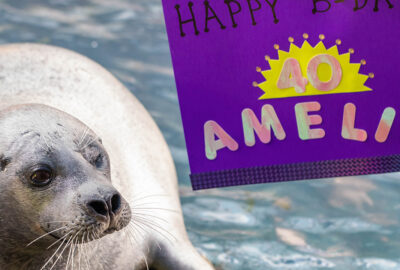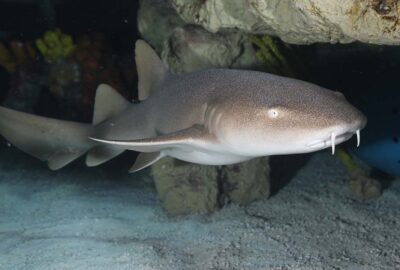Construction Update: As we enhance the look and feel of the Aquarium and make structural improvements to the penguin exhibit, some exhibits are temporarily closed, and the penguins are off exhibit until February 13. Learn more.
Recapping the Stellwagen Bank Conservation Excursion
By New England Aquarium on Friday, September 23, 2022

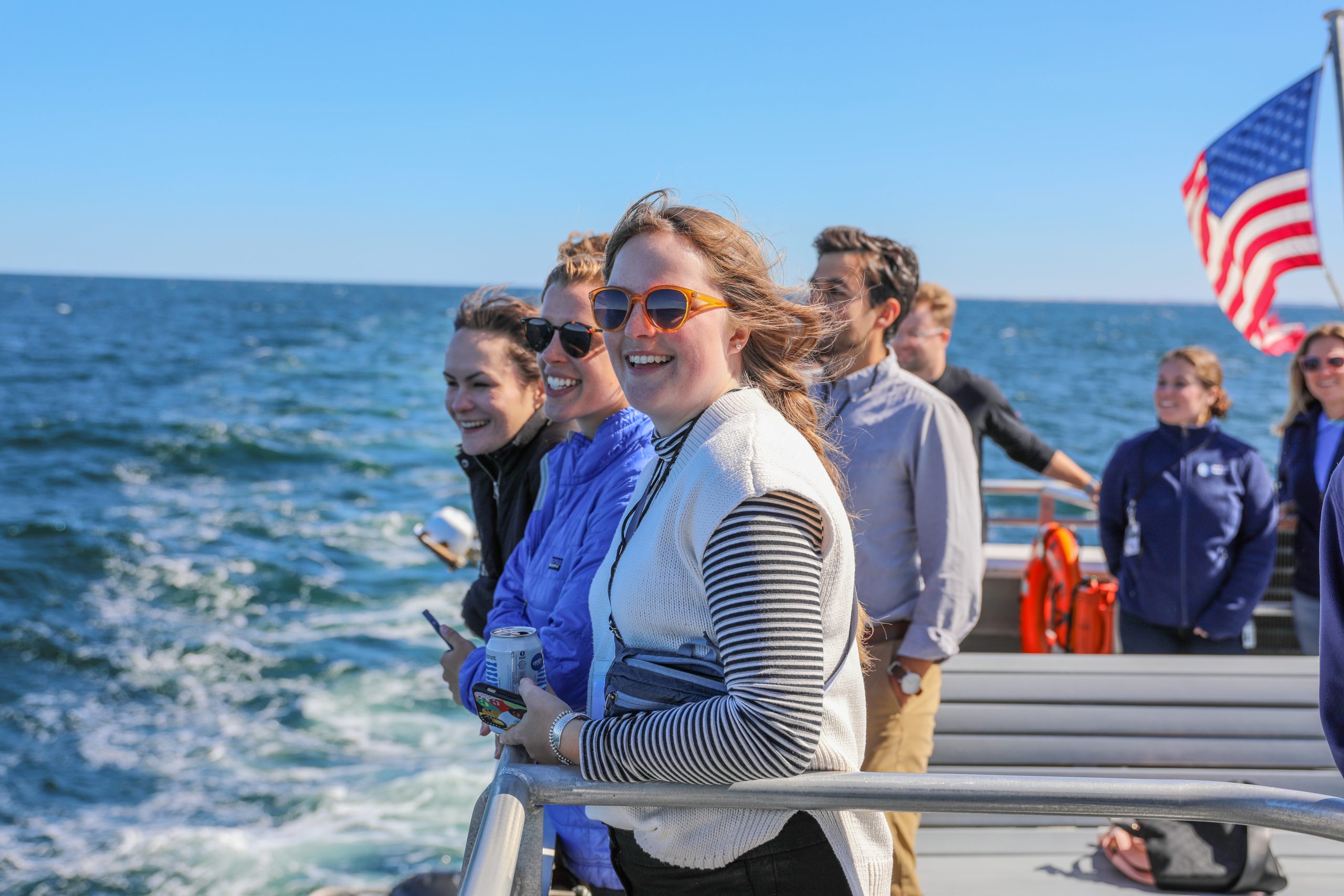
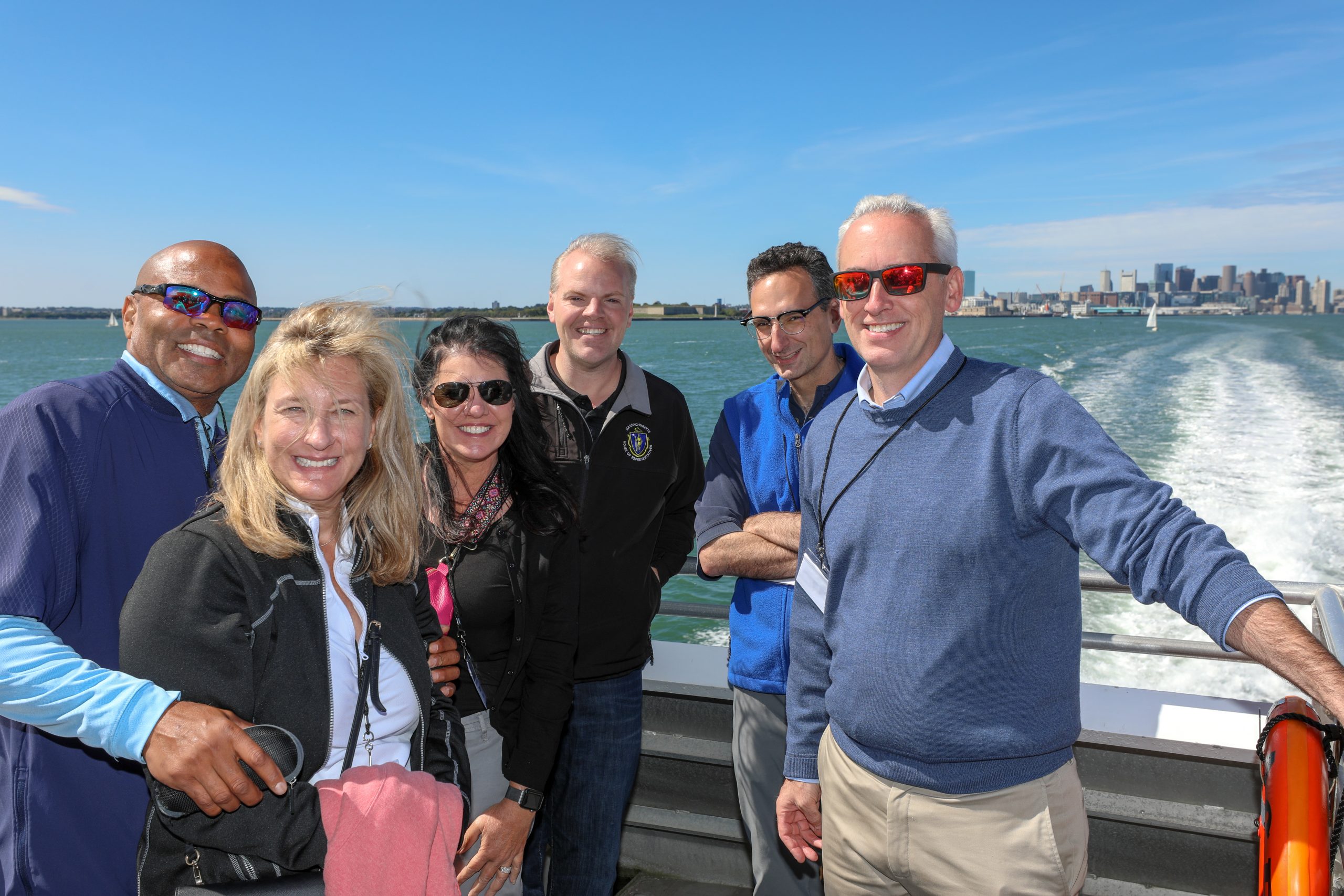
On Friday, September 16, policymakers from across Massachusetts, alongside New England Aquarium colleagues and members of NOAA, boarded the Cetacea for a whale watch excursion to Stellwagen Bank National Marine Sanctuary.
The afternoon’s Conservation Excursion was part of the Aquarium’s year-long celebration of the 50th anniversary of the federal National Marine Sanctuaries Act and the 30th anniversary of Stellwagen Bank National Marine Sanctuary. It was also an opportunity for policymakers and New England Aquarium staff to discuss the importance of ocean conservation and the impacts of climate change on the ocean and our coastlines.
“You may be aware that we are a 53-year-old ocean conservation organization,” said Aquarium VP of External Relations Rick Musiol in his opening remarks to guests. Over 75 attendees, including representatives from the City of Boston, the Commonwealth of Massachusetts, and the federal government were in attendance. Musiol invited the group to spend the afternoon getting to know each other and learning more about the Aquarium’s conservation efforts. “As you leave today, we hope you get a renewed sense and understanding of all the things the Aquarium does,” Musiol said. “Most of you know us for our beautiful home here on Central Wharf, and yet there’s so much more we do every day to fulfill our mission.”
That mission—to create a vibrant and vital ocean for future generations —was illustrated with four stations around the boat addressing the Aquarium’s pillars of work: Advancing Animal and Ocean Health, Promoting Responsible Use, Inspiring and Developing Ocean Advocates, and Partnering to Build Resilient Communities. Aquarium staff were on-hand at each station to talk about the Aquarium’s breadth of work, from sea turtle rehabilitation and North Atlantic right whale research to the Aquarium’s vision for an inclusive waterfront and community engagement programs. Given the current state and federal proposals focused on combatting climate change, implementing right whale protections, and supporting a transition to ropeless fishing gear, it proved an opportunity for Aquarium staff to serve as experts and resources on these important issues.
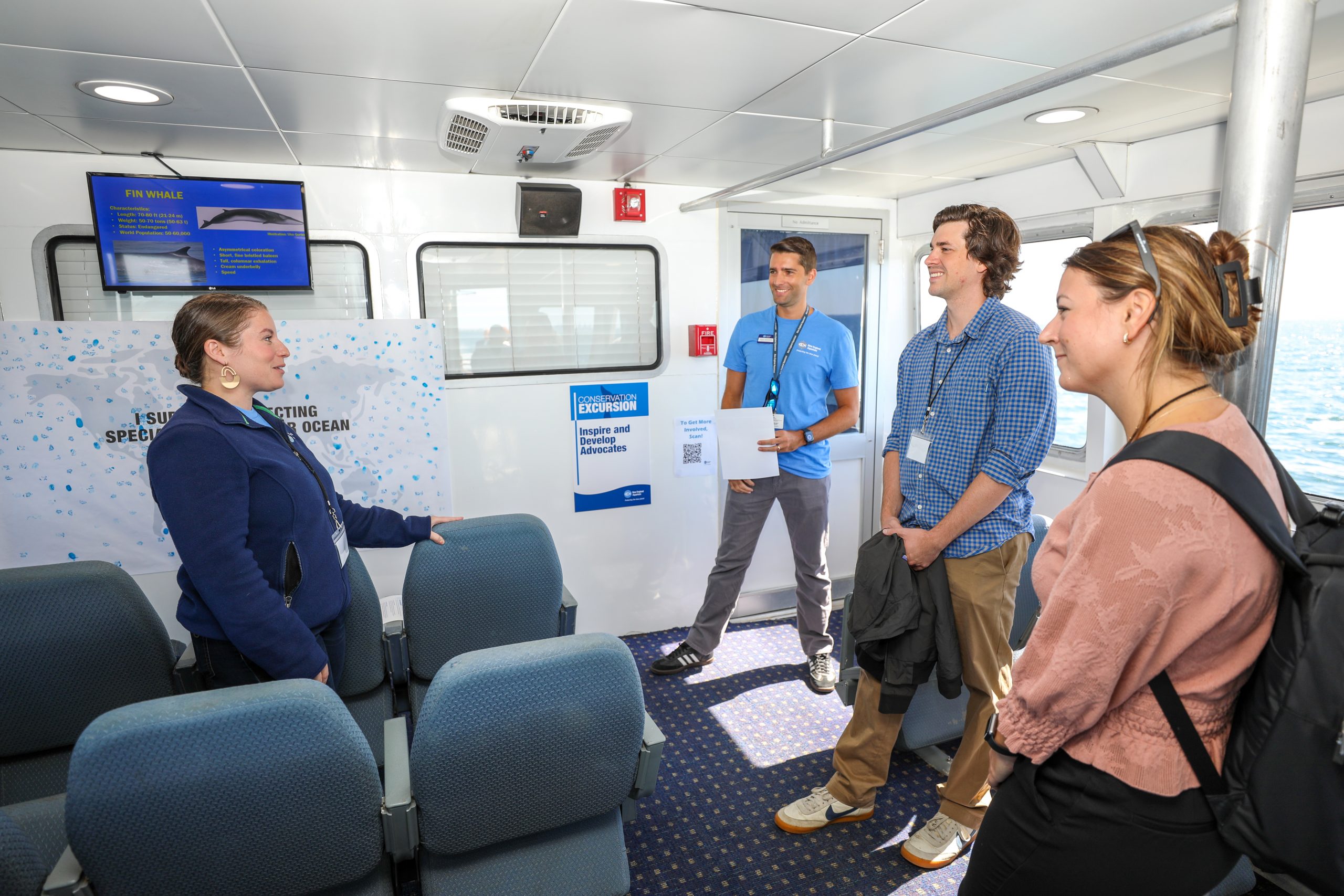
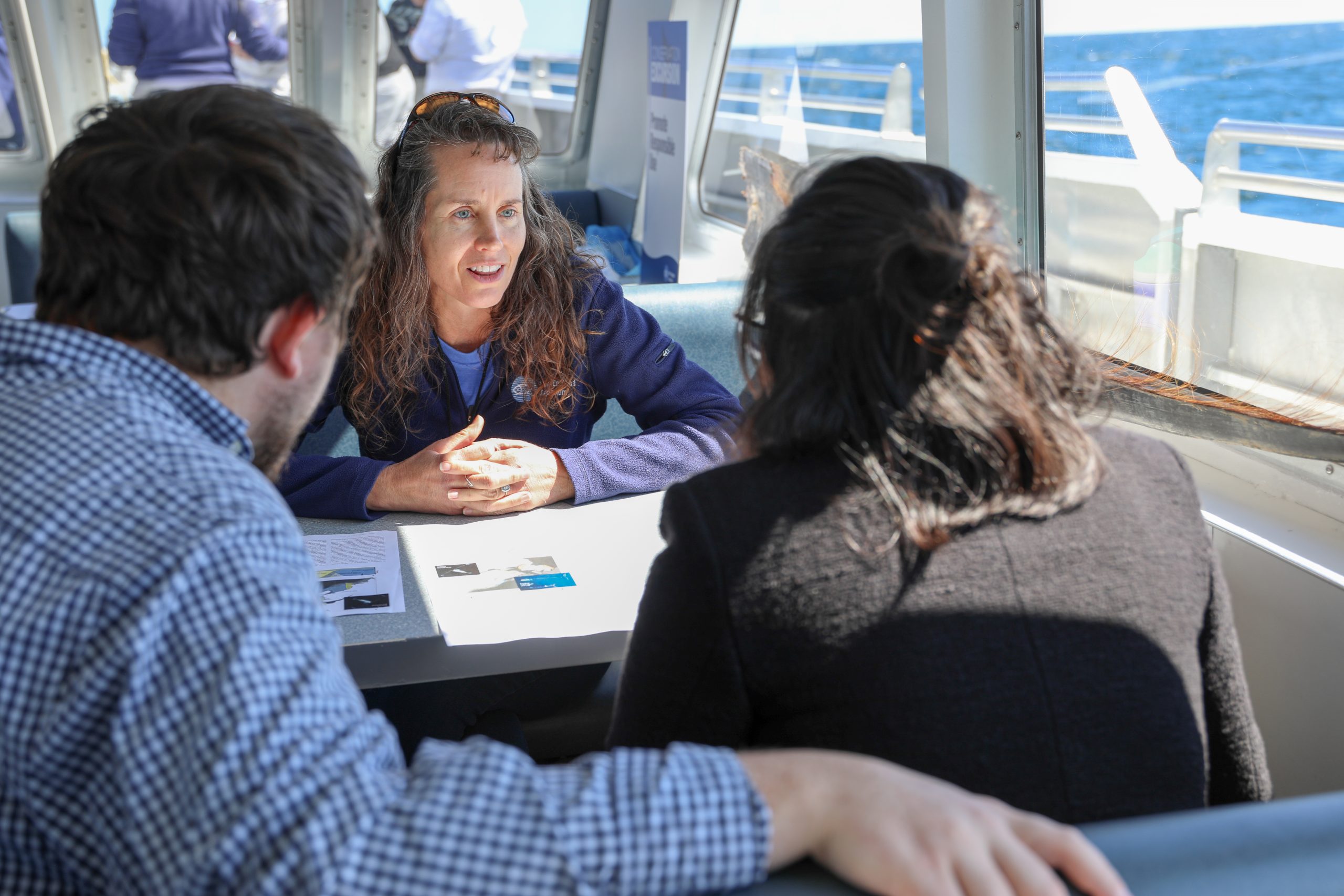
But all around the Cetacea, policymakers and Aquarium staff enjoyed meeting and conversing as the ship sailed toward Stellwagen Bank. The Stellwagen Bank National Marine Sanctuary between Cape Ann and Cape Cod is New England’s only national marine sanctuary. Stellwagen Bank National Marine Sanctuary is also located in the rapidly warming Gulf of Maine. In commemorating the sanctuary system’s legacy, it’s important to be mindful of the need to strengthen the protections in our marine protected areas to continue supporting the breadth of wildlife that lives in these waters.
“With the magnificent whales, the seabirds, the marine life, it’s really the equivalent of the Serengeti,” said Ben Haskell, the NOAA Stellwagen Bank National Marine Sanctuary Deputy Superintendent. The Conservation Excursion brought to life how the Aquarium has long partnered with government and outside organizations to further ocean conservation. As an education partner with Stellwagen Bank, the Aquarium has helped open the sanctuary to visitors on whale watch excursions, inspiring ocean stewardship by allowing people to see wildlife thrive in a protected habitat.
Having so many ocean experts on board helped the crew spot signs of whales in choppy waters. Right around lunch, the first “blow” was sighted—the spray whales emit when breathing at the surface looks a bit like a puff of smoke. After a bit more searching, a large splash happened off the ship’s starboard side, a sign that a whale was breaching nearby. Soon, a group of three humpback whales appeared. Everyone gathered, pointing excitedly as the whales swam past just a few hundred feet away. As one dove, he showed off his fluke, letting the crew identify him as “Chunk,” a seven-to-eight-year-old humpback nicknamed for having a missing piece in his dorsal fin. It was a highlight of a day spent engaged in discussing the many ways we can protect the blue planet and all the animals who call the ocean home.
As the Cetacea returned to the harbor and the city’s skyline came into view, Boston City Council President Ed Flynn’s opening remarks came to mind. He’d reflected on how, through collaboration, positive change can happen for our oceans and those who enjoy them—an important message that underscored the goal of the day.
“Growing up in South Boston and spending many years in the US Navy, I have always been surrounded by water. I grew up looking at the ocean and have sent my kids on field trips to George’s Island where they experienced the harbor islands up close.” Flynn said. “These are some of the most foundational experiences of being a Bostonian, and we must do more to protect our oceans and marine life as we combat challenges with climate change.”

